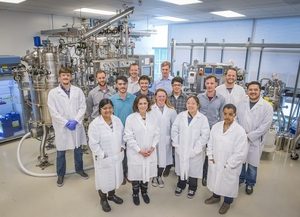
Lygos, a start-up biotechnology company founded based on technologies catalyzed by the DOE Office of Science through the Berkeley Lab-led Joint BioEnergy Institute (JBEI), discovered a new, environmentally-benign way to manufacture malonic acid using synthetic biology.
In less than four years from this initial discovery, the startup, working with experts at Berkeley Lab’s Advanced Biofuels Process Demonstration Unit (ABPDU), proved the scalability of the new malonic acid biomanufacturing process at production costs competitive with conventional technologies.
Malonic acid is a high value chemical used for applications from pharmaceuticals to metals manufacturing and many others. Until recently, the only way to make malonic acid and its derivative compounds was from petroleum using toxic chemicals such as cyanide and chloroacetate. The Lygos bioprocess is based on a genetically engineered microbe producing a non-native enzyme that can convert a cellular precursor to the desired renewable chemical.
Read the Biomass Magazine story about the successful Lygos demonstration project.
